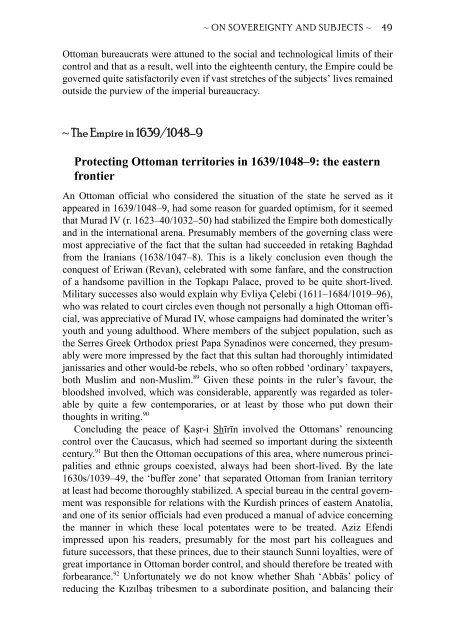The Ottoman Empire and the World Around It - Course Information
The Ottoman Empire and the World Around It - Course Information
The Ottoman Empire and the World Around It - Course Information
Create successful ePaper yourself
Turn your PDF publications into a flip-book with our unique Google optimized e-Paper software.
~ ON SOVEREIGNTY AND SUBJECTS ~ 49<br />
<strong>Ottoman</strong> bureaucrats were attuned to <strong>the</strong> social <strong>and</strong> technological limits of <strong>the</strong>ir<br />
control <strong>and</strong> that as a result, well into <strong>the</strong> eighteenth century, <strong>the</strong> <strong>Empire</strong> could be<br />
governed quite satisfactorily even if vast stretches of <strong>the</strong> subjects’ lives remained<br />
outside <strong>the</strong> purview of <strong>the</strong> imperial bureaucracy.<br />
~ <strong>The</strong> <strong>Empire</strong> in 1639/1048–9<br />
Protecting <strong>Ottoman</strong> territories in 1639/1048–9: <strong>the</strong> eastern<br />
frontier<br />
An <strong>Ottoman</strong> official who considered <strong>the</strong> situation of <strong>the</strong> state he served as it<br />
appeared in 1639/1048–9, had some reason for guarded optimism, for it seemed<br />
that Murad IV (r. 1623–40/1032–50) had stabilized <strong>the</strong> <strong>Empire</strong> both domestically<br />
<strong>and</strong> in <strong>the</strong> international arena. Presumably members of <strong>the</strong> governing class were<br />
most appreciative of <strong>the</strong> fact that <strong>the</strong> sultan had succeeded in retaking Baghdad<br />
from <strong>the</strong> Iranians (1638/1047–8). This is a likely conclusion even though <strong>the</strong><br />
conquest of Eriwan (Revan), celebrated with some fanfare, <strong>and</strong> <strong>the</strong> construction<br />
of a h<strong>and</strong>some pavillion in <strong>the</strong> Topkapı Palace, proved to be quite short-lived.<br />
Military successes also would explain why Evliya Çelebi (1611–1684/1019–96),<br />
who was related to court circles even though not personally a high <strong>Ottoman</strong> official,<br />
was appreciative of Murad IV, whose campaigns had dominated <strong>the</strong> writer’s<br />
youth <strong>and</strong> young adulthood. Where members of <strong>the</strong> subject population, such as<br />
<strong>the</strong> Serres Greek Orthodox priest Papa Synadinos were concerned, <strong>the</strong>y presumably<br />
were more impressed by <strong>the</strong> fact that this sultan had thoroughly intimidated<br />
janissaries <strong>and</strong> o<strong>the</strong>r would-be rebels, who so often robbed ‘ordinary’ taxpayers,<br />
both Muslim <strong>and</strong> non-Muslim. 89 Given <strong>the</strong>se points in <strong>the</strong> ruler’s favour, <strong>the</strong><br />
bloodshed involved, which was considerable, apparently was regarded as tolerable<br />
by quite a few contemporaries, or at least by those who put down <strong>the</strong>ir<br />
thoughts in writing. 90<br />
Concluding <strong>the</strong> peace of K. as. r-i Shīrīn involved <strong>the</strong> <strong>Ottoman</strong>s’ renouncing<br />
control over <strong>the</strong> Caucasus, which had seemed so important during <strong>the</strong> sixteenth<br />
century. 91 But <strong>the</strong>n <strong>the</strong> <strong>Ottoman</strong> occupations of this area, where numerous principalities<br />
<strong>and</strong> ethnic groups coexisted, always had been short-lived. By <strong>the</strong> late<br />
1630s/1039–49, <strong>the</strong> ‘buffer zone’ that separated <strong>Ottoman</strong> from Iranian territory<br />
at least had become thoroughly stabilized. A special bureau in <strong>the</strong> central government<br />
was responsible for relations with <strong>the</strong> Kurdish princes of eastern Anatolia,<br />
<strong>and</strong> one of its senior officials had even produced a manual of advice concerning<br />
<strong>the</strong> manner in which <strong>the</strong>se local potentates were to be treated. Aziz Efendi<br />
impressed upon his readers, presumably for <strong>the</strong> most part his colleagues <strong>and</strong><br />
future successors, that <strong>the</strong>se princes, due to <strong>the</strong>ir staunch Sunni loyalties, were of<br />
great importance in <strong>Ottoman</strong> border control, <strong>and</strong> should <strong>the</strong>refore be treated with<br />
forbearance. 92 Unfortunately we do not know whe<strong>the</strong>r Shah ‘Abbās’ policy of<br />
reducing <strong>the</strong> Kızılbaş tribesmen to a subordinate position, <strong>and</strong> balancing <strong>the</strong>ir


